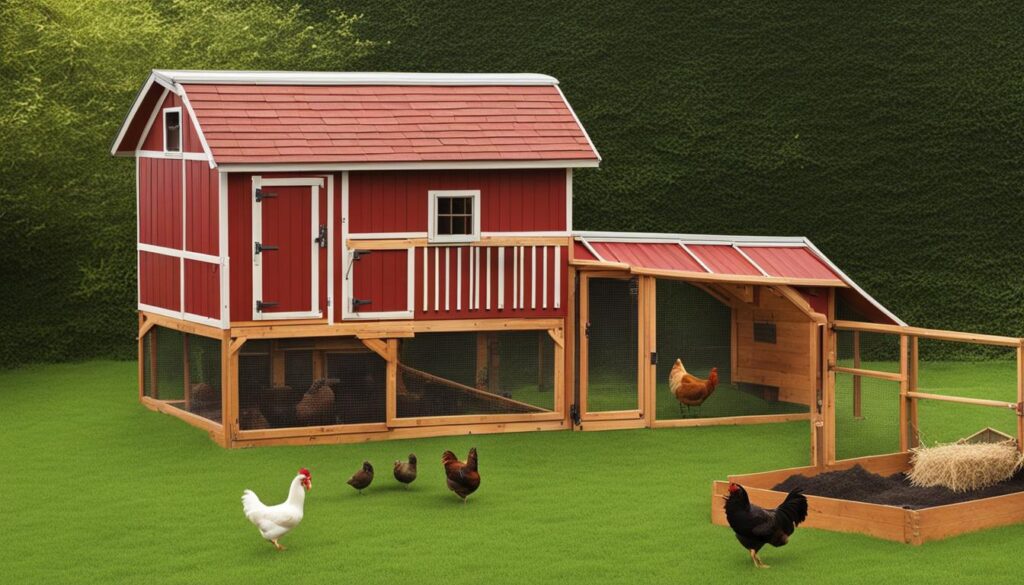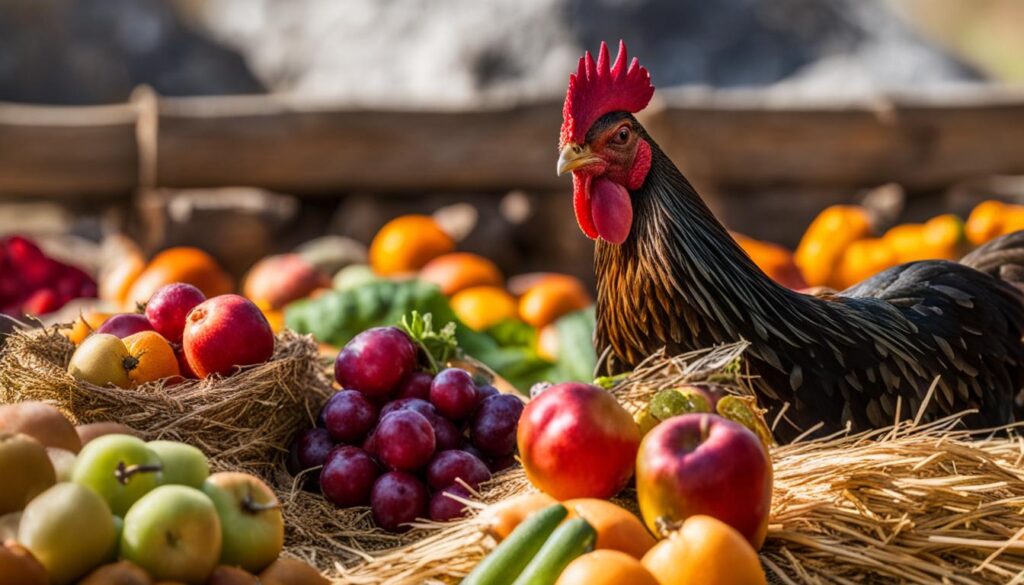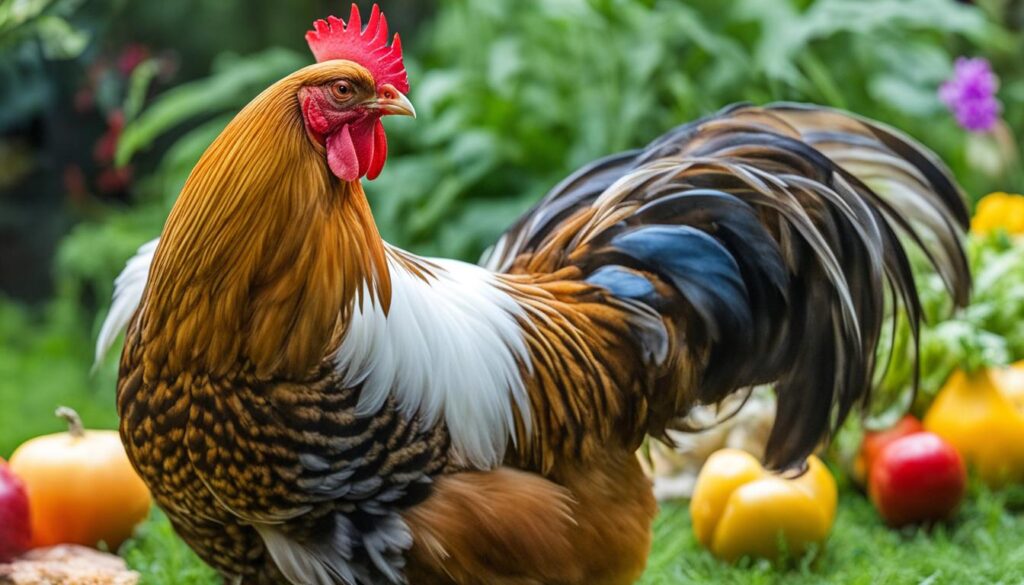Welcome to the wonderful world of backyard poultry care, where our feathered friends bring joy and purpose to our lives. As a hobby farmer myself, I’ve spent many days tending to my flock and nurturing the delightful Columbian Rock Hen. In this beginner’s guide to chickens and hobby farming, I will share my firsthand experience, some crucial tips and tricks, and helpful insights to ensure you get the most out of your time with these endearing birds.
Join me in exploring the ins and outs of raising backyard chickens, from understanding the unique characteristics of the Columbian Rock Hen to creating the perfect habitat and discovering the joys they bring to any hobby farm. Through my practical, tried-and-true techniques for caring for poultry, I will help you make the best choices for your own flock and hobby farm with confidence.
Key Takeaways:
- Understand the heritage and temperament of the Columbian Rock Hen
- Create the ideal habitat for your Columbian Rock Hens
- Learn about the nutritional needs of the breed
- Discover practical techniques for health and wellness
- Maximize egg-laying potential with expert tips
- Protect your flock from common predators
- Master the dynamics of your Columbian Rock Hen flock
Understanding the Columbia Rock Cross Hen: An Overview
The Columbian Plymouth Rock Chicken, also known as the Columbian Rock Cross Hen or Columbian Rock Cross Chicken, is a highly regarded breed among hobby farmers and backyard poultry enthusiasts alike. This versatile and hardy fowl is not only an excellent layer but also boasts a uniquely attractive appearance and a gentle demeanor, making them the perfect addition to any poultry enthusiast’s backyard. In this section, I will shed light on the heritage, physical attributes, and temperament of this wonderful breed.
Originating in America, the Columbian Rock Cross Hen was first introduced in the late 19th century. This breed is a cross between the Plymouth Rock Chicken and the White Wyandotte Chicken, resulting in a hardy and attractive bird that has won the hearts of chicken keepers worldwide. Their adaptability to a wide range of climatic conditions and ease of care make them a popular choice among hobby farmers and small-scale producers alike.
“The Columbian Rock Cross Hen is an all-American breed that is not only loved for its productivity but also deeply admired for its striking appearance and gentle temperament.”
Physically, the Columbian Rock Cross Chicken is a medium to large-sized bird, with a predominantly white body adorned with black markings on their neck and tail feathers. Their red, rose-shaped comb and wattles lend them a striking appearance that makes them truly stand out. Adult hens typically weigh between 6.5 and 7.5 pounds, while roosters can weigh up to 9.5 pounds.
- History: Developed in America during the late 19th century.
- Heritage: Plymouth Rock Chicken and White Wyandotte Chicken.
- Size: Medium to large-sized birds; adult hens weigh 6.5 to 7.5 pounds, roosters up to 9.5 pounds.
- Appearance: White body with black neck and tail feather markings; red, rose-shaped comb, and wattles.
The Columbian Rock Cross Hen’s temperament is another factor that has made it a favorite among poultry keepers. They are known to be docile, friendly, and easy to handle, which makes them perfect for individuals looking to raise chickens in their backyard or small-scale hobby farm. Their calm demeanor also helps ensure that they live comfortably with other breeds and in a variety of coop layouts.
| Attribute | Description |
|---|---|
| Temperament | Docile, friendly, and easy to handle |
| Adaptability | Can handle a wide range of climatic conditions and easily adjust to various coop environments |
| Compatibility | Gets along well with other chicken breeds in mixed flocks |
| Lifestyle | Thrives in backyard settings and small-scale hobby farms |
Overall, the Columbian Rock Cross Hen is a magnificent breed that offers a winning combination of physical beauty, pleasing temperament, and exceptional adaptability. Whether you are a seasoned hobby farmer or a newcomer to backyard chicken keeping, you can’t go wrong with adding these wonderful birds to your flock.
Creating the Perfect Habitat for Your Columbian Rock Hens
Creating a perfect habitat for your poultry is crucial to keep your chickens safe and content. The Columbian Rock Chicken coop should cater to the needs of these particular birds while ensuring their comfort. In this guide, I will delve into tried-and-tested design elements for building an ideal coop and discuss the optimal space and environmental conditions for your Columbian Rock Hens.

Coop Requirements and Setup
A well-designed chicken coop is fundamental for a comfortable and functional habitat for the Columbian Rock Hen. Having experience with coop dimensions, nesting box design, roosting space, and security features, I recommend the following guidelines for your coop setup:
- Allow at least 3-4 square feet of space per bird to ensure enough room for movement and reduce stress.
- Provide one nesting box for every four chickens, accommodating the needs of multiple layers.
- Ensure adequate roosting space for chickens to perch, with at least 8-10 inches of space per bird.
- Incorporate predator-proof features such as sturdy locks and hardware cloth on windows and vents.
You may need to tailor your coop setup based on the number of chickens you intend to keep and the geography of your land. Hobby farm chicken environments may vary, but adhering to these guidelines will help ensure a pleasant and secure space for your birds.
Environmental Conditions and Space
The happiness and health of your birds depend on their environment. Here are some essential considerations to keep in mind when managing space and environmental conditions within your backyard poultry housing:
- Ample Space: Meeting the space needs for chickens is crucial to prevent fights, stress, and disease. Columbian Rock Hens need room to forage, dust bathe, and move around comfortably.
- Adequate Ventilation: Proper airflow in the coop is vital to maintaining a healthy and odor-free environment. Ensure proper placement of vents above roosting areas to prevent drafts on your birds.
- Controlled Temperature: Columbian Rock Hens can adapt to various climates, but it’s essential to keep the chicken coop environmental conditions stable, ensuring appropriate insulation.
- Access to Natural Light: Chickens require natural light to regulate their behavior and laying capabilities. Ensure your coop has windows to allow sunlight to enter, encouraging a consistent laying pattern.
Remember: The quality of your chickens’ environment directly affects their well-being and egg-laying capabilities. Invest time and effort in creating an ideal habitat that caters to their needs.
In conclusion, designing the perfect habitat for your Columbian Rock Hens requires attention to detail and careful planning. By following the guidelines for coop requirements, environmental conditions, and space needs, your birds will have a comfortable and thriving environment, ensuring a healthy and productive addition to your hobby farm.
Nutritional Needs of Columbian Rock Chickens
Understanding the importance of a well-balanced diet is crucial to raising robust and productive Columbian Rock Hens. In this section, I will discuss my approach to feeding these chickens, detailing the types of feed, the balance of nutrients necessary, and how to adjust the diet as they mature and during laying periods.

Like all chickens, Columbian Rock Hens have specific poultry dietary requirements that must be met to ensure their health and productivity. A balanced diet generally consists of proteins, carbohydrates, fats, vitamins, minerals, and water.
Did you know? A well-balanced diet is not only essential for the overall health of your chickens but also plays a major role in their egg production.
Here is a general guideline for the nutritional requirements of chickens during different stages of their growth:
| Stage | Protein | Calcium | Phosphorus |
|---|---|---|---|
| Chicks (0-10 weeks) | 18-22% | 0.9-1.2% | 0.35-0.5% |
| Growers (11-20 weeks) | 14-18% | 0.7-1.0% | 0.3-0.45% |
| Layers (21 weeks +) | 15-18% | 3.5-4% | 0.25-0.4% |
When it comes to feeding Columbian Rock Hens, you can choose from a range of commercial feeds that cater to the different stages of their growth. Starter feeds are designed for chicks, grower feeds for young hens, and layer feeds for laying hens.
While commercial feeds usually provide a balanced diet, it’s essential to supplement them with additional sources of nutrients, such as:
- Grit for proper digestion
- Calcium for strong eggshells; crushed eggshells and oyster shells are excellent sources
- Green vegetables for vitamin A and minerals
- Fruits for extra vitamins and hydration
- Protein-rich treats, like mealworms or grubs, to support growth and laying
Ensure that clean, fresh water is always available for your hens, as it plays a significant role in digestion, nutrient absorption, and temperature regulation.
As your chickens mature and transition into laying, adjust their diet accordingly. Laying hens require increased calcium and phosphorus levels for strong eggshells and healthy bone development. Monitor your flock’s health and adjust the diet as needed to maintain their well-being.
In summary, providing your Columbian Rock Chickens with a nutritionally balanced and age-appropriate diet ensures their health, happiness, and egg-laying productivity. Happy and healthy chickens bring endless joy and rewards to your hobby farm!
Health and Wellness: Keeping Your Columbian Rock Cross Healthy
Maintaining a healthy flock is a top priority for any hobby farmer. In this section, we’ll touch on the common health issues that affect Columbian Rock Cross chickens and practical prevention strategies, drawing on my experience to highlight signs of distress and proactive healthcare measures.

Common Health Issues and Prevention
Like any poultry breed, Columbian Rock Cross chickens may encounter health issues such as parasites, respiratory conditions, and nutritional deficiencies. By keeping an eye on your flock and implementing preventive measures, you can ensure their well-being and longevity.
Prevention is better than cure when it comes to poultry healthcare.
Here are some common health concerns and corresponding preventive measures for your Columbian Rock Cross chickens:
- Parasites: Regularly inspect your chickens for external parasites such as mites and lice, and deworm them to keep internal parasites at bay.
- Respiratory conditions: Provide proper ventilation in the coop and monitor any signs of respiratory distress, such as wheezing or gasping for breath.
- Nutritional deficiencies: Offer a balanced diet with essential vitamins and minerals, ensuring chicken’s dietary needs are met throughout their lives.
Along with the above preventive measures, implementing vaccination protocols, controlling parasites, and maintaining proper biosecurity practices are beneficial. Keep in mind that your vigilance plays a significant role in your chickens’ overall health and wellness.
| Health Concern | Preventive Measure | Key Points |
|---|---|---|
| Parasites | Regular Inspection and Treatment | Monitor for external parasites, administer deworming medication for internal parasites. |
| Respiratory Conditions | Proper Ventilation | Ensure adequate air circulation in the coop, monitor for signs of respiratory distress. |
| Nutritional Deficiencies | Balanced Diet | Offer a diet rich in essential vitamins and minerals to meet dietary needs. |
By focusing on Columbian Rock Cross health and applying effective poultry wellness practices, you can prevent chicken disease, ensuring a thriving and productive flock. Remember that disease prevention in poultry requires a committed approach to regular health checks and preventive measures, paired with knowledge about common Columbian Rock Cross chicken health issues. Doing so will save you time, money, and heartache, keeping your chickens happy and healthy for years to come.
Maintaining A Productive Flock: Eggs and Incubation Hints
Raising a productive Columbian Rock Cross flock can be extremely rewarding, and a vital component of this success lies in understanding their egg production and incubation. By providing optimal conditions, monitoring their laying patterns, and following a few egg incubation tips, you can ensure a thriving, healthy flock and a consistent supply of eggs.
Columbian Rock Cross Egg Color and Laying Patterns
A fascinating aspect of the Columbian Rock Cross hens is their distinctive egg color, laying frequency, and the factors that influence their production. These hens typically lay large, light brown eggs, setting them apart from other chicken breeds. Their laying patterns vary, with the frequency depending on several factors.
One primary influencing factor is the hen’s age. Younger hens, around 6-8 months old, will begin laying at a slower pace. As they mature, their egg production increases, often laying 4-5 eggs per week, ensuring a consistent supply from your flock.
Another crucial element is the environmental conditions, including temperature, lighting, diet, and stress levels. You may observe changes in the chicken laying patterns due to fluctuations in temperature, daylight hours, and flock dynamics. Regularly ensuring fresh water, proper nutrition, and a consistent, comfortable environment encourages consistent egg production in chickens.
Remember: maintaining a stable, stress-free environment is key to supporting consistent egg production in Columbian Rock Cross hens!
Here’s a quick summary of factors influencing Columbian Rock Cross egg production:
- Age of the hen
- Environmental conditions (temperature, lighting, diet, and stress levels)
- Consistency of the habitat, including nutrition and comfort
Monitoring your hens’ laying patterns will help you fine-tune their environment to optimize egg production and maintain a thriving flock.
Egg Incubation Tips for Columbian Rock Cross Hens
Incubating your Columbian Rock Cross eggs can be an exciting process. Aspiring hobby farmers seeking to grow their flock through hatching chicks should heed the following incubation tips:
- Choose the right incubator: Invest in an incubator with temperature and humidity control, ensuring a stable and consistent environment for successful egg incubation.
- Monitor temperature and humidity: Maintaining a stable temperature of 99.5°F (37.5°C) in a forced-air incubator or 101.5°F (38.6°C) in a still-air incubator, along with a relative humidity of 50-55% during the first 18 days and 60-65% for the last three days, is crucial for proper embryo development.
- Rotate the eggs: Turn the eggs at least three times a day to prevent the embryo from sticking to the shell and ensure equal heat distribution. An automatic egg-turner is a significant investment for this process.
- Keep the incubator clean: Make sure to clean and sanitize your incubator between each hatching cycle to prevent the spread of bacteria and diseases.
- Monitor and candle the eggs: Regularly check the eggs for proper development by candling them with a bright light and monitoring their progress. This allows you to remove any non-viable eggs, focusing the incubator’s resources on healthy, developing embryos.
By adhering to these tips, you can improve your egg incubation success, helping grow and maintain a happy Columbian Rock Cross flock.
Protecting Your Columbian Rock Cross Chickens from Predators
Security is non-negotiable when it comes to your hens. It’s crucial to take all necessary precautions in safeguarding your Columbian Rock Cross Chickens from common predators, drawing on real-life tactics that have worked on my hobby farm. Predators can not only cause harm and stress to your flock but also result in a decline in egg production, making it essential to invest in predator-proof poultry housing and other safety measures to ensure the welfare of your Columbian Rock Chickens.

Here are some key steps to take to protect your chickens from predators:
- Fortify Your Coop: Make sure your coop is sturdy, predator-resistant, and escape-proof. Use resilient materials such as sturdy wire mesh and solid wood. Ensure gaps, windows, and doors are secure, and use latches that are not easily opened by predators.
- Install Fencing: Protect your chicken run or free-range area with highly secure fencing. Consider digging the fencing into the ground to deter burrowing predators, or use an electric fence to discourage climbing or digging animals.
- Proper Lighting: Install motion-sensor lights and ensure the coop is well-lit at night, as predators generally avoid well-lit areas.
- Regularly Inspect the Area: Frequently check your coop and surrounding areas for evidence of attempted predator intrusion, such as digging or bite marks. Address any identified potential entry points immediately.
- Eliminate Attractants: Keep feed and water tightly sealed and free of pests to avoid attracting predators in search of easy food.
- Provide Hiding Places: Offering hiding spots and roosts within your coop and yard can give your chickens a quick place of refuge, should a predator manage to breach your defenses.
It’s also important to take into account the specific types of predators in your region when designing your poultry protection plan. Here are some common predators and corresponding preventative measures to consider:
| Predator | Preventative Measures |
|---|---|
| Raccoons | Install latch locks on coop doors and windows, and use 1/2-inch wire mesh on coop walls, windows, and vents. |
| Foxes | Implement secure fencing around the property, dug into the ground to prevent burrowing, and use electrified wires if necessary. |
| Snakes | Seal any small gaps or openings in the coop, and keep the surrounding area clean to eliminate hiding places. |
| Birds of Prey | Use overhead netting or mesh to cover the chicken run, and provide ample hiding places for your flock. |
It’s important to stay vigilant and adapt your predator-protection strategies as needed. By investing time and effort into securing your poultry housing and environment, you can ensure the safety and well-being of your treasured Columbian Rock Chickens.
The Social Life of Columbian Rock Hens: Behavior and Coop Dynamics
Understanding the social behavior of Columbian Rock Hens is essential for maintaining harmony within your backyard chicken flock. The coop dynamics play a significant role in the welfare of your chickens, as these birds have their own social structure that needs to be respected and managed. As a hobby farmer, I have witnessed firsthand how the interaction between Columbian Rock Hens contributes to a peaceful and productive environment.
When expanding your chicken flock with new members, successful integration is crucial to minimize stress and maintain order. Introducing new chickens, especially Columbian Rock Cross Chicks, requires a well-planned and carefully executed approach that promotes a smooth transition for all birds involved. In my experience, isolation and gradual exposure have proven effective in managing the pecking order and promoting a sense of familiarity among the chickens, ultimately fostering a harmonious coop.
Introducing New Birds to the Flock
By understanding the nuances of your Columbian Rock Hen family and how to effectively introduce new members, you can create a thriving backyard flock that benefits from the breed’s unique characteristics and endearing social behavior. Whether you are a first-time hobby farmer or a seasoned enthusiast, mastering the art of chicken coop dynamics will result in a happy, healthy, and productive environment that is truly a joy to maintain.
FAQ
What is the origin of the Columbian Rock Hen?
The Columbian Rock Hen is a crossbreed between the Columbian Plymouth Rock Chicken and the White Rock Chicken, resulting in a hardy and versatile bird suitable for hobby farmers.
What is the temperament of the Columbian Rock Hen?
Columbian Rock Hens are known for their docile, friendly, and easily adaptable nature, making them a perfect addition to a backyard poultry environment.
What are the optimal conditions for the Columbian Rock Hen’s habitat?
The ideal habitat for Columbian Rock Hens includes a well-built and ventilated coop, access to natural light, temperature control, and ample space for roaming and engaging in natural behaviors.
What should I feed my Columbian Rock Hens?
A balanced diet is essential and should consist of high-quality poultry feed, fresh water, and essential nutrients, including vitamins and minerals, tailored to the age and laying stage of the birds.
What are the common health issues affecting Columbian Rock Hens, and how can I prevent them?
Common health issues include parasites, respiratory conditions, and nutritional deficiencies. Preventative measures include proper vaccination, parasite control, maintaining coop cleanliness, and providing adequate nutrition.
What is the egg color and laying pattern of Columbian Rock Cross Hens?
Columbian Rock Cross Hens typically lay large brown eggs with a frequency that varies depending on factors such as age, nutrition, and environmental conditions.
How can I protect my Columbian Rock Cross Chickens from predators?
Ensuring a secure coop, installing predator-proof fencing, and implementing effective lighting strategies are essential in safeguarding your chickens from common predators.
How can I successfully introduce new birds to my existing Columbian Rock Hen flock?
Gradually introducing new birds in neutral territory, monitoring their interactions, and providing ample space can minimize stress and promote harmonious integration within the flock.
